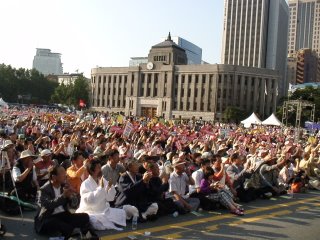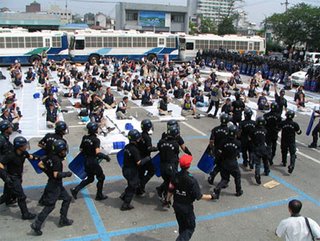Here's my backgrounder on what's been going with the KGEU, feel free to use it for progressive purposes... Should be up over at
interlocals later today.
Labour conflict escalating in South Korea
J.Doucette
Following an ILO regional meeting in Busan, South Korea, labour relations have soured in that country over the month of September with a large government offensive against the 140,000 member Korean Government Employee’s Union, and a back door agreement with a government-friendly union selectively advancing segments of the government’s labour reform roadmap which many fear will pave the way for further expansion of irregular work on the peninsula.
Offensive against the KGEU
Over the last month the Korean government has waged an aggressive crackdown against the Korean Government Employee's Union (KGEU), forcibly closing down 121 of 251 KGEU chapter offices nationwide -- literally welding them shut with metal bars and iron plating -- and arresting, as of October 10th, over 100 members of the KGEU and other organizations in solidarity with them.
The origins of this struggle are related to the slow consolidation of public sector labour unions in the post-dictatorship era. Korea has been under continuing pressure from local and international organizations to recognize its public sector trade unions. Though many of these unions have existed for some time, the Korean government has been taking the slow road to legally recognizing them. The Korean Teacher's Union was only recognized in 1999, and there is a large ‘public servants’ union (employee's in sectors such as railroads and transportation), but the government has still to recognize Korea's large government employee's union (KGEU), which has been underground for quite sometime.
In many ways, the cause of this crisis is a constitutional matter. As Article 33 of the Korean constitution states:
Article 33 [Unions]
(1) To enhance working conditions, workers have the right to independent association, collective bargaining, and collective action.
(2) Only those public officials who are designated by law, have the right to association, collective bargaining, and collective action.
(3) The right to collective action of workers employed by important defense industries may be either restricted or denied under the conditions as prescribed by law.
As the KGEU cannot ‘legally’ exercise these rights without legal recognition, the Korean government have refused to recognize them until the union agrees to certain limitations on their rights: basically giving up the right to strike and dis-allowing what it terms ‘higher’ public officials (basically half of the KGEU’s 140,000 members) from joining the union. The union refused to agree, in principle, with the limitation of the three basic labour rights as recognized in the Korean constitution. Which seems reasonable, as the government’s offer here is on constitutionally shaky grounds. Nonetheless, the Korean governments’ response to the union in its short history have been severe.
Since it was founded in 2002, almost all KGEU public meetings, assemblies, workshops, or press conferences have become sites of police violence and, frankly, unbelievable resistance, with union members, at times, literally keeping the riot police at bay while carrying out important votes. Nonetheless, the KGEU has organized strikes and weathered the persecution, even growing in size. For its part, the Korean government has slowly ratcheted up the pressure, declaring a special law on the rights of government employees forbidding them from bargaining and taking collective action, including penal provisions for those who disobey. The law, passed in 2002, included a grace period which ended in 2006. Since then the oppression has only escalated.
Staff elections of the KGEU were blockaded in January of this year, and in February ministers from the Ministries of Justice, Government and Home Affairs, and Labour issued a joint statement and countermeasures against the KGEU which was followed in March with instructions for the voluntary withdrawal of all union members and notification of all cases of non-compliance so that legal action may be taken. Between March and September the government kept up its pressure by forcing local governments to report on the actions of KGEU members and submit the names of members involved actions.
In September, at an ILO regional meeting in Busan, South Korea, the ILO criticized the Korean government for denying public servants their basic labour rights, and delegates further denounced the intervention into the matter by the Ministry of Government and Home and Affairs and Minissty of Justice, saying that these ministries have no right to intervene in labour conflict and that collective agreements must be made by bargaining between the union and employer’s, not third parties. Nonetheless, the current crackdown against the KGEU began just days after the ILO Busan conference ended, which is ironic mostly because the Korean government had hosted the conference to showcase improvements to labour relations in the country.
Labour relations worsening
What this says about the overall conditions of labour rights and democracy on the Korean peninsula is not encouraging. September’s crackdown against the KGEU was accompanied by the signing of tripartite agreement between the government friendly (or state-corporatist) union, the Federation of Korean Industries (FKTU), business, and government. The agreement, signed without the consent or participation of the larger Korean Confederation of Trade Unions (KCTU) delays important clauses on union pluralism and paves the way for expanded irregularization of employment. This makes a mockery not only of the concept of tripartite negotiation between labour, management, and government endorsed by the ILO – 2.5-ism may be a better term to describe its current Korean embodiment – it also sets a dangerous precedent for distinctively anti-democratic labour relations to come, and has thus been criticized by a wide segment of Korean civil society, including legal and constitutional experts.
The
KCTU, meanwhile, has promised more strikes and industrial action against the roadmap bill and ongoing union repression in November.
2006 Copyleft




